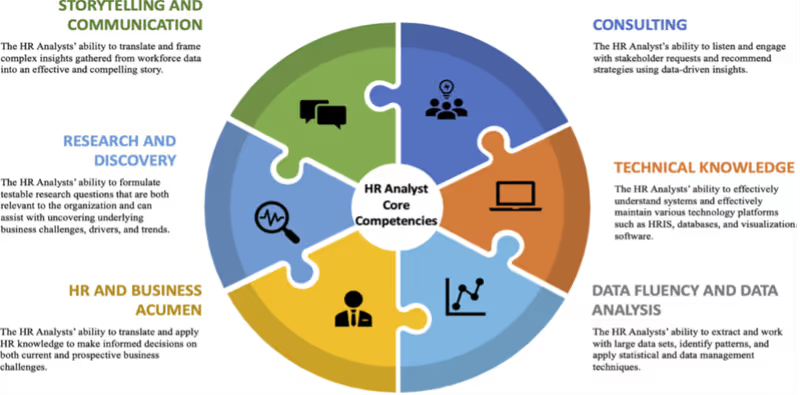How an HR Analyst Can Help Your Organization Reduce Risk
HR professionals have a lot on the go: handling employee complaints, writing and analyzing internal policies, hiring and firing, and managing incidents and investigations. But what do you do with all that data? If your team has an HR analyst, they can study the outcomes of those processes to determine what’s going well and what could be improved. In this guide, you’ll learn what an HR analyst does and why hiring one can help drive success in your organization.
Improve your HR data analytics with one tool
With Case IQ's award-winning business intelligence tools, you can study incident trends and make data-driven decisions without spending tedious hours or risking human error. Learn how by chatting with one of our experts today.
Request a DemoWhat Does an HR Analyst Do?
HR generalists' main tasks involve working closely with employees to improve their experiences. HR analysts, on the other hand, take data about that employee experience and analyze it to suggest improvements to policies, procedures, and programs.“HR analytics requires a sophisticated understanding of both the ‘people’ side and the ‘technical’ side of business,” explains Dr. Rene Arseneault, Assistant Professor at Universite Laval.[caption id="attachment_12513" align="aligncenter" width="800"]

Source: McCartney et al[/caption]As you can see in the infographic above, McCartney et. al identified six core competencies for the HR analyst role:
- Storytelling & communication
- Research & discovery
- HR & business acumen
- Consulting
- Technical knowledge
- Data fluency & analysis
However, this competency wheel is just a guideline. HR analysts' tasks will vary by the size and structure of their organization and existing HR team, as well as their professional specialty. "For example," says Arseneault, "HRIS analysts will require more IT-focused skill sets, whereas HR business analysts will require more business acumen-related competencies (i.e., consulting)."
Get more insights into the HR analyst role
Watch Dr. Arseneault's full webinar to learn a brief overview of HR predictive analytics, potential uses of HR data analytics for workplace investigations, and more.
Watch NowWhy Your Company Needs an HR Analyst
Not sure your organization needs an HR analyst on staff? Below are two big tasks they can tackle that could mean happier employees and higher business success.
Conduct Investigations Benchmarking
“Benchmarking in the context of workplace investigations involves comparing an organization’s investigation processes, procedures, and outcomes against industry standards or best practices,” Arseneault says.Whether you’re just now establishing proper investigative processes or haven’t reviewed them in a while, it’s important to know the strengths and weaknesses of your program. This way, you can make informed decisions that reduce risk for your employees and your company.Not sure where to start? Arseneault suggests assessing these elements of your investigative program:
- Efficiency & Timeliness
- Compliance & Legal Standards
- Quality of Investigations
- Documentation & Reporting
- Employee Satisfaction
- Preventative Measures
- Confidentiality & Privacy
An HR analyst can comb through both qualitative and quantitative data in these areas. Then, they’ll suggest which processes to keep and which are high-risk and/or low-ROI.
Improve the Incident Reporting Experience
HR analysts can also study your whistleblower hotline data to help you not only uncover misconduct trends, but also improve the reporting experience for employees.First, the HR analyst can look at past incident data. Are there any types of misconduct that are reported more frequently than others? Does more harassment occur at one office location than the rest? Uncovering these types of trends can help you focus your employee training modules, policy updates, and other preventive measures to reduce risk.Your HR analyst can also determine how to get the most out of your hotline. Do employees use one type of reporting method (e.g., email, webform, phone, text) more than other available options? Do you receive incomplete reports because of a long or hard-to-use form? Do employee satisfaction survey results not match up with the number or nature of reports you receive? Answering these types of questions will guide you when deciding what types of reporting mechanisms to offer, how to train employees on their use, and ways to encourage a “speak up” culture.This type of data analysis can take hours and is still prone to human error, even for a trained analyst. If your HR team uses a platform like Case IQ, though, you can reduce the time, stress, and risk of HR data analytics. Our built-in business intelligence tool analyzes your historic case data; with just a few clicks you can create trend heat maps, charts, and graphs to share with the team, the board, or other stakeholders to contribute to data-driven business decisions.
How Case IQ Can Help
Case IQ’s modern case management software helps HR teams uncover, investigate, and prevent incidents and employee misconduct. Read more about our best-in-class intake system, secure all-in-one platform, and award-winning BI tools here.










